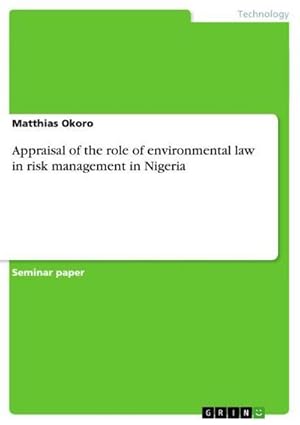9783656758495 - Appraisal of the Role of Environmental Law in Risk Management in Nigeria by Okoro, Matthias (2 results)
Product Type
- All Product Types
- Books (2)
- Magazines & Periodicals
- Comics
- Sheet Music
- Art, Prints & Posters
- Photographs
- Maps
- Manuscripts & Paper Collectibles
Condition
- All Conditions
- New (2)
- Used
Binding
- All Bindings
- Hardcover
- Softcover (2)
Collectible Attributes
- First Edition
- Signed
- Dust Jacket
- Seller-Supplied Images (2)
- Not Print on Demand (1)
Free Shipping
- Free US Shipping
Seller Location
Seller Rating
-
Appraisal of the role of environmental law in risk management in Nigeria
Published by GRIN Verlag Okt 2014, 2014
ISBN 10: 3656758492ISBN 13: 9783656758495
Seller: BuchWeltWeit Ludwig Meier e.K., Bergisch Gladbach, Germany
Book Print on Demand
Taschenbuch. Condition: Neu. This item is printed on demand - it takes 3-4 days longer - Neuware -Seminar paper from the year 2012 in the subject Environmental Sciences, grade: A, University of Nigeria (CENTER FOR ENVIRONMENTAL MANAGEMENT AND CONTROL), course: ENVIRONMENTAL MANAGEMENT AND CONTROL, language: English, abstract: In ideal risk management, a prioritization process is followed whereby the risks with the greatest loss (or impact) and the greatest probability of occurring are handled first, and risks with lower probability of occurrence and lower loss are handled in descending order. In practice the process of assessing overall risk can be difficult, and balancing resources used to mitigate between risks with a high probability of occurrence but lower loss versus a risk with high loss but lower probability of occurrence can often be mishandled. Intangible risk management identifies a new type of a risk that has a 100% probability of occurring but is ignored by Government or organization due to a lack of identification ability. In Nigeria, some time, this is what is obtainable in the social and physical environment. In view of the above fact, environmental laws have been put in place to regulate every activity on the environment to manage the risk involved in these process and stage of development in other to avoid an impending or a looming catastrophe. According to the International Network for Environmental Compliance and Enforcement (INECE), the major environmental issues in Nigeria are 'drought and flooding, air pollution, deforestation, loss of biodiversity, freshwater availability, degradation of soil and vegetation, and widespread poverty.' Government and other organizations hope to provide protection and mitigation regarding pollution and other disasters before their impacts contaminate the African environment as well as the global environment. Therefore chronicled in this write up, is the appraisal of the role of Environmental Law in risk management. 72 pp. Englisch.
-
Appraisal of the role of environmental law in risk management in Nigeria
Published by GRIN Verlag, 2014
ISBN 10: 3656758492ISBN 13: 9783656758495
Seller: AHA-BUCH GmbH, Einbeck, Germany
Book
Taschenbuch. Condition: Neu. Druck auf Anfrage Neuware - Printed after ordering - Seminar paper from the year 2012 in the subject Environmental Sciences, grade: A, University of Nigeria (CENTER FOR ENVIRONMENTAL MANAGEMENT AND CONTROL), course: ENVIRONMENTAL MANAGEMENT AND CONTROL, language: English, abstract: In ideal risk management, a prioritization process is followed whereby the risks with the greatest loss (or impact) and the greatest probability of occurring are handled first, and risks with lower probability of occurrence and lower loss are handled in descending order. In practice the process of assessing overall risk can be difficult, and balancing resources used to mitigate between risks with a high probability of occurrence but lower loss versus a risk with high loss but lower probability of occurrence can often be mishandled. Intangible risk management identifies a new type of a risk that has a 100% probability of occurring but is ignored by Government or organization due to a lack of identification ability. In Nigeria, some time, this is what is obtainable in the social and physical environment. In view of the above fact, environmental laws have been put in place to regulate every activity on the environment to manage the risk involved in these process and stage of development in other to avoid an impending or a looming catastrophe. According to the International Network for Environmental Compliance and Enforcement (INECE), the major environmental issues in Nigeria are 'drought and flooding, air pollution, deforestation, loss of biodiversity, freshwater availability, degradation of soil and vegetation, and widespread poverty.' Government and other organizations hope to provide protection and mitigation regarding pollution and other disasters before their impacts contaminate the African environment as well as the global environment. Therefore chronicled in this write up, is the appraisal of the role of Environmental Law in risk management.



